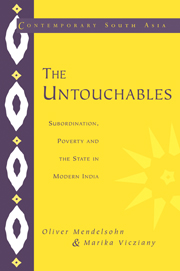Book contents
- Frontmatter
- Contents
- List of tables
- Glossary
- Preface
- 1 Who are the Untouchables?
- 2 The question of the ‘Harijan atrocity’
- 3 Religion, politics and the Untouchables from the nineteenth century to 1956
- 4 Public policy I: adverse discrimination and compensatory discrimination
- 5 Public policy II: the anti-poverty programs
- 6 The new Untouchable proletariat: a case study of the Faridabad stone quarries
- 7 Untouchable politics and Untouchable politicians since 1956
- 8 The question of reservation: the lives and careers of some Scheduled Caste MPs and MLAs
- 9 Subordination, poverty and the state in modern India
- Bibliography
- Index
8 - The question of reservation: the lives and careers of some Scheduled Caste MPs and MLAs
Published online by Cambridge University Press: 05 June 2012
- Frontmatter
- Contents
- List of tables
- Glossary
- Preface
- 1 Who are the Untouchables?
- 2 The question of the ‘Harijan atrocity’
- 3 Religion, politics and the Untouchables from the nineteenth century to 1956
- 4 Public policy I: adverse discrimination and compensatory discrimination
- 5 Public policy II: the anti-poverty programs
- 6 The new Untouchable proletariat: a case study of the Faridabad stone quarries
- 7 Untouchable politics and Untouchable politicians since 1956
- 8 The question of reservation: the lives and careers of some Scheduled Caste MPs and MLAs
- 9 Subordination, poverty and the state in modern India
- Bibliography
- Index
Summary
During the period of the V. P. Singh Government in 1989–90 the issue of compensatory discrimination moved to the very centre of Indian political life for the first time. The Mandal controversy was about preference for the other ‘socially and educationally backward classes’ (under Article 15(4) of the Constitution), that is the classes other than the Scheduled Castes and Tribes. It was a contest about power as well as about access to public employment for the ‘backward’ castes. The assumption was that higher-level bureaucrats possess serious power and status, and that reservation is a short cut to appropriation of these properties. In short, the bitterness of the Mandal affair arose from its construction as a contest over just who is to run India.
By contrast, compensatory discrimination for the Scheduled Castes has never presented itself as a mechanism for redistribution of power in India as a whole. It was not until the advent of Mayawati's first administration in Uttar Pradesh that Scheduled Caste officers were seriously considered a centre of power, and the brevity of that administration curtailed any serious development of the issue. While there is growing opposition to reservation for the Scheduled Castes as well as for the other backward classes – the two are now increasingly connected in the popular mind – there is another level of criticism of the former on the ground of the suggested deficiencies of its beneficiaries.
- Type
- Chapter
- Information
- The UntouchablesSubordination, Poverty and the State in Modern India, pp. 238 - 257Publisher: Cambridge University PressPrint publication year: 1998



